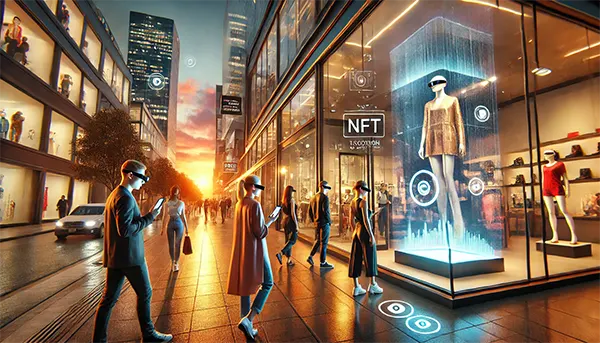NFT Marketing in 2025: How Brands Use Tokens to Engage Audiences

NFTs (Non-Fungible Tokens) have evolved significantly, becoming an integral part of marketing strategies for global brands. In 2025, companies leverage blockchain-based tokens not just as collectibles but as powerful engagement tools that foster brand loyalty, exclusivity, and community involvement. This article explores how brands are utilising NFTs to revolutionise marketing and build long-term relationships with their audience.
Brand Loyalty and Exclusive Memberships Through NFTs
One of the most effective applications of NFTs in marketing is the creation of exclusive membership programmes. Instead of traditional loyalty cards or digital subscriptions, brands now offer NFT-based memberships that grant access to unique experiences, discounts, or premium content.
Luxury fashion brands such as Gucci and Louis Vuitton have pioneered this trend by issuing NFT-backed VIP passes, allowing customers to attend exclusive runway shows, access limited-edition product drops, and receive early access to sales. This strategy not only enhances customer engagement but also strengthens brand prestige.
Similarly, automotive brands are leveraging NFTs to offer exclusive perks. Companies like Porsche and Ferrari provide NFT holders with invitations to test-driving events, special merchandise, or behind-the-scenes access to design studios, creating a sense of belonging among their most dedicated customers.
Gamification and Interactive Marketing Campaigns
Gamification has become a dominant marketing strategy in 2025, and NFTs are at the core of this transformation. Brands use digital assets to reward user participation, fostering deeper engagement through interactive experiences.
For example, major sports brands such as Nike and Adidas have integrated NFTs into fitness apps, where users earn tokenised rewards for completing workouts. These tokens can be exchanged for real-world discounts, merchandise, or even unique digital wearables for avatars in metaverse environments.
Similarly, fast-food chains like McDonald’s and Burger King have launched NFT-based scavenger hunts, encouraging customers to visit multiple locations to collect exclusive digital collectibles. These campaigns drive foot traffic and increase customer retention through engaging digital experiences.
Influencer and Community-Driven NFT Campaigns
Social media influencers and content creators are playing a significant role in shaping NFT marketing strategies. Brands collaborate with influencers to release limited-edition NFT drops, leveraging their established communities to maximise engagement.
For example, YouTube personalities and Twitch streamers now offer NFTs that provide fans with exclusive perks such as personalised shoutouts, access to private Discord channels, or special behind-the-scenes content. These NFT drops not only create additional revenue streams but also deepen audience connection.
Additionally, brands are incorporating user-generated content into NFT campaigns. Fashion retailers allow customers to design virtual clothing items that, if selected, are turned into NFTs and sold with profit-sharing models. This approach encourages creativity while fostering a deeper brand-community relationship.
Phygital Experiences: Bridging Digital and Physical Worlds
In 2025, NFTs are no longer confined to the digital space. Brands are blending physical and digital experiences, often referred to as “phygital” activations, to enhance consumer interactions.
Retail giants like Zara and H&M now offer NFT-backed receipts, which not only verify product authenticity but also provide customers with digital twins of their physical purchases. These digital counterparts can be used in metaverse platforms, allowing users to dress their avatars in real-world clothing.
Similarly, beverage companies such as Coca-Cola and Pepsi are embedding NFTs into product packaging, enabling consumers to unlock special virtual rewards, AR experiences, or even limited-time discounts through QR codes linked to blockchain-based assets.

NFTs in Events and Experiential Marketing
The event industry has embraced NFTs as a tool for enhancing audience participation and exclusivity. Concerts, festivals, and conferences are integrating NFT-based ticketing solutions, providing added value beyond mere entry passes.
Music festivals such as Coachella and Tomorrowland now offer NFT ticketing systems that grant holders access to VIP areas, backstage meet-and-greets with artists, or exclusive merchandise. These digital passes also serve as collectibles, allowing fans to retain a digital memento of their experience.
Moreover, sports franchises are using NFTs to transform fan engagement. Football clubs such as Manchester United and FC Barcelona provide NFT season passes that include unique experiences, such as virtual meet-ups with players, signed digital memorabilia, and priority access to limited-edition merchandise.
Challenges and Future Trends in NFT Marketing
Despite the widespread adoption of NFTs in marketing, challenges remain. Environmental concerns surrounding blockchain technology, regulatory uncertainties, and digital asset volatility pose obstacles for brands looking to integrate NFTs into their strategies.
However, advancements in eco-friendly blockchain solutions, such as Ethereum’s move to proof-of-stake, are mitigating some sustainability concerns. Additionally, brands are exploring multi-chain solutions to enhance accessibility and reduce transaction fees.
Looking ahead, NFT marketing will continue to evolve, with greater integration into AI-driven personalisation strategies, AR-enhanced consumer experiences, and Web3 loyalty programmes. As brands refine their approaches, NFTs are set to remain a key element in engaging modern audiences.
